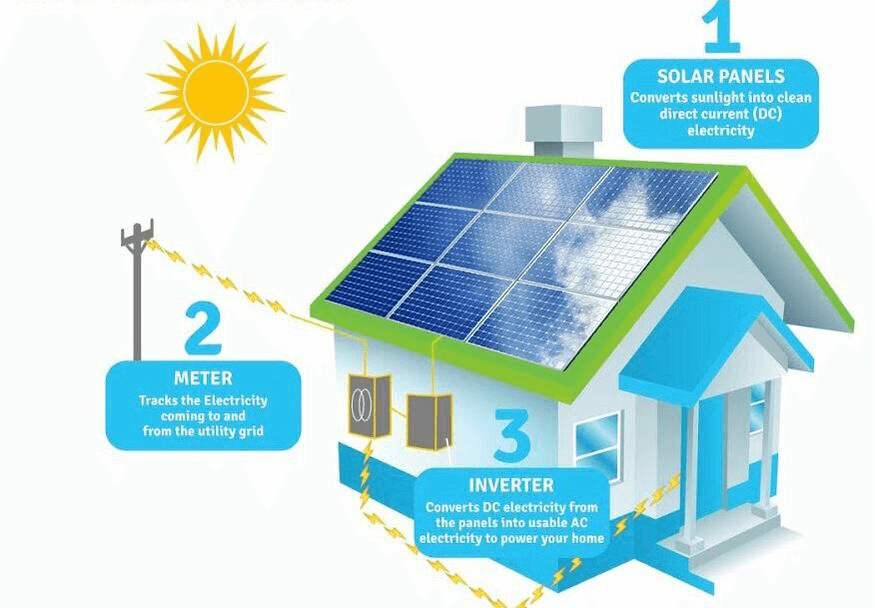How Simply Solar Illinois Helps Illinois Homeowners Switch to Solar Power
How Simply Solar Illinois Helps Illinois Homeowners Switch to Solar Power
Blog Article
How Solar Energy Can Aid You Conserve Cash and Minimize Your Carbon Footprint
The integration of solar power into your power portfolio provides a compelling possibility for both economic cost savings and ecological stewardship. As different federal government incentives come to be readily available, the question occurs: just how can one effectively browse the preliminary investments and ongoing advantages of solar modern technology to take full advantage of both economic and environmental gains?
Comprehending Solar Energy Financial Savings
While the change to solar power often involves an initial investment, recognizing solar power financial savings is important for home owners and services alike. Solar power systems can dramatically reduce electricity costs by taking advantage of the sunlight's power, translating into considerable long-term financial benefits. By creating their own electrical power, users reduce reliance on grid power, which goes through fluctuating prices. These financial savings can build up with time, typically causing a fast roi.
Moreover, solar power systems might qualify for various economic rewards, consisting of tax obligation credit scores and refunds, further boosting their cost-effectiveness. The schedule of net metering enables individuals to market excess power back to the grid, developing an additional revenue stream. These aspects contribute to the general savings connected with solar power.

Along with direct monetary financial savings, solar power supplies the included benefit of increasing residential or commercial property value. Residences outfitted with photovoltaic panels are often extra appealing to buyers, as they guarantee reduced power expenses - Simply Solar Illinois. Recognizing these aspects is vital for any person taking into consideration solar energy, as it highlights not just the potential economic gains, but additionally the broader environmental and financial benefits of taking on renewable resource solutions
Initial Costs vs. Long-Term Conveniences
When examining solar power, it is vital to evaluate the first expenses against the long-term benefits. The upfront financial investment for photovoltaic panels, installation, and related tools can be significant, commonly ranging from $15,000 to $30,000, depending on the system size and home power needs. This preliminary expenditure may discourage some home owners; nevertheless, it is critical to take into consideration the possible savings with time.
Once installed, solar energy systems can substantially reduce and even get rid of month-to-month power bills, bring about significant long-term economic advantages. Studies indicate that home owners can save anywhere from $10,000 to $30,000 over the life-span of their planetary system, commonly 25 years. In addition, lots of states provide incentives, tax obligation credit histories, and rebates that can counter initial prices, making solar more obtainable.

Minimizing Your Carbon Impact
Minimizing your carbon impact is a vital consideration in today's eco conscious society, and embracing solar energy is among one of the most reliable approaches to accomplish this objective. Solar power is a tidy, eco-friendly source that significantly diminishes dependence on fossil gas, which are significant contributors to greenhouse gas discharges.

Additionally, the prevalent fostering of solar innovation urges the advancement of eco-friendly jobs and supports technologies in power storage space and performance. The more individuals and organizations buy solar power, the greater the cumulative decrease in carbon emissions, promoting a cleaner atmosphere for future generations.
Federal Government Rewards and Rebates
Adopting solar power not only profits the environment yet can also lead to significant financial savings, particularly with the accessibility of federal government incentives and discounts. Various federal, state, and neighborhood programs are developed to encourage property owners and businesses to spend in solar power systems, making the transition more cost effective.
Among the most prominent rewards is the Federal Financial Investment Tax Obligation Credit Report (ITC), which enables planetary system owners to deduct a substantial portion of the installment expenses from their federal taxes. This motivation has actually been critical in lowering the upfront costs associated with solar power systems. Additionally, lots of states provide their very own tax obligation credits, gives, and rebates that can additionally enhance cost savings.
Additionally, some neighborhood governments offer real estate tax exemptions for solar installations, ensuring that house owners do not deal with raised property tax obligations as a result of their renewable energy financial investments. Energy companies pop over here might also offer incentives, consisting of net metering and feed-in tolls, which allow solar power users to market excess power back to the grid.
Selecting the Right Planetary System
Selecting their explanation the appropriate solar system is vital for making the most of energy effectiveness and monetary benefits. The choice rests on several aspects, consisting of power demands, budget plan, and offered area. Home owners should start by examining their power consumption to determine the system dimension needed for optimum efficiency.
Next, take into consideration the various sorts of solar modern technologies available. Simply Solar Illinois. Photovoltaic (PV) panels are the most usual, converting sunshine straight right into electricity, while solar thermal systems focus on home heating water. Each type has distinct advantages relying on private requirements
Budget factors to consider are also vital. Preliminary installment prices can vary significantly, so it's important to contrast quotes from multiple suppliers and explore financing alternatives. Federal government motivations and discounts can additionally minimize the monetary problem, making planetary systems a lot more easily accessible.
Final Thought
In recap, solar power offers a feasible solution for achieving substantial price financial savings while simultaneously minimizing carbon emissions. The initial financial investment, though significant, returns substantial long-term financial benefits, with possible savings ranging from $10,000 to $30,000 over 25 years. Additionally, the environmental advantages of solar energy add to lasting practices critical for combating environment adjustment. Government rewards enhance the usefulness of solar technology fostering, encouraging a change towards a cleaner, much more economically efficient energy resource.
Report this page